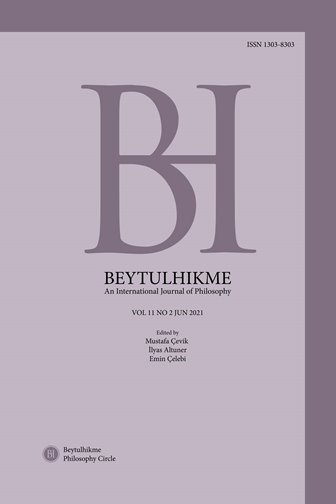Author :
Abstract
Epistemoloji tarihinin büyük bölümünde, merkezî bir mesele, belki de temel mesele “dış dünya” sorunu olmuştur. Dış dünya hakkındaki bilgilerimizle ilgili sorular sorulduğunda, genellikle iki şey önceden varsayılır: birincisi bilgi kavramı, ikincisi ne kadar muğlak ve şematik olursa olsun “dış dünya” kavramı. Peki, dışsal nesnelerin varlığını nasıl bilebiliyoruz? Başka bir ifadeyle algılarımız, hangi nesneleri algıladığımızı ve biz onları algılamazken de var olabilmelerini nasıl sağlıyorlar? İşaret edilen soru empirizmin algısal temsil teorisi ile cevaplanabilir. Çünkü empirizm belirli bilgi parçalarını belirli şeyleri algılama durumlarıyla ilişkilendirir. Bir empirist olarak kabul edilen John Locke, dış dünyayı kendi temsil teorisi ile temellendirerek görünüş ve gerçeklik ayrımına gider. Böylece algının belirli istisnalar dışında tutarlı olduğunu kabul etmek zorunda kalır. Bu çalışma bir yandan empirist bakış açısıyla dış dünyadaki nesnelerin varlığına duyulan inancın haklı gösterilmesi ve bilgi olarak kabul edilmesi nasıl mümkün olabilir sorusuna cevap ararken diğer yandan Locke’un epistemolojisinde empirizmin ilkelerini dış dünya problemine uygulayarak bir çözümleme sunacaktır.
Keywords
Abstract
For most of the history of epistemology, a central, perhaps central, issue has been the problem of the “external world.” When asked about our knowledge of the outside world, two things are usually presupposed: the first is the concept of knowledge, the second is the concept of the “external World”, no matter how vague and schematic. How do we know the existence of external objects? In other words, how do our perceptions ensure which objects we perceive and that they can exist even when we do not perceive them? The question pointed out can be answered with the perceptual representation theory of empiricism. Because empiricism relates certain pieces of information to certain situations of deception. John Locke, considered an empiricist, goes to the distinction between appearance and reality, basing the outside world on his theory of representation. Thus, he has to admit that his perception is consistent with certain exceptions. This study, on the one hand, searches for an answer to the question of how it is possible to justify belief in the existence of objects in the external world and to be accepted as knowledge from an empiricist point of view, on the other hand, it will present an analysis by applying the principles of empiricism in Locken's epistemology to the problem of the external world.
Keywords
- Altınörs, A. (2016). İdealar ve Dil Bağlamında Locke ile Leibniz. İstanbul: Bilge Kültür Sanat Yayınları.
- Anlı, Ö. F. (2017). Antik Yunanın Post-modernleri. Bilim ve Ütopya, 203, 64-67.
- Aster, V. E. (1972). Bilgi Teorisi ve Mantık. (Çev. M. Gökberk). İstanbul: İstanbul Üniversitesi, Edebiyat Fakültesi Yayınları.
- Bennett, J. (1999). Locke, Berkeley, Hume: Central Themes. Oxford: Oxford University Press.
- Bonjour, L. & Sosa, E. (2003). Epistemic Justification: Internalism vs. Externalism, Fo- undations vs. Virtues. New York: Blackwell Publishing.
- Çelebi, E. (2017). John Locke’un İdeler Teorisi: Eleştirel Bir İnceleme. Ankara: Gece Ki- taplığı.
- Çelebi, E. (2019). John Locke’ta Temsil Teorisi: Sözcük ve İde İlişkisi. Birey ve Toplum Dergisi, 18, 73-90.
- Denkel, A. (2003). Bilginin Temelleri. İstanbul: Doruk Yayınları.
- Denkel, A. (1982). Locke ve Berkeley’de Dış Dünya. Yazko Felsefe Yazıları, 4, 67-78.
- Descartes, R. (2015). Meditasyonlar: Metafizik Üzerine Düşünceler. (Çev. Ç. Dürüş- ken). İstanbul: Alfa Yayınları.
- Didier, J. (2009). John Locke. (Çev. A. Altınörs). İstanbul: Paradigma Yayınları.
- İnceoğlu, M. (1993). Tutum, Algı, İletişim. Ankara: V Yayınları.
- Locke, J. (2004). İnsan Anlığı Üzerine Bir Deneme. (Çev. V. Hacıkadiroğlu). İstanbul: Kabalcı Yayınevi. Lyons, Jack. C. (2009) Perception and Basic Beliefs Zombies, Modules, and the Problem of the External World. Oxford: Oxford University Press.
- Mehdiyev, N. (2011). Çağdaş Epistemolojiye Giriş. İstanbul: İnsan Yayınları.
- McCulloch, G. (2003). The Life of the Mind: An Essay on Phenomenological Externalism. London and New York: Routledge.
- Musgrave, A. (1997). Sağduyu Bilim ve Kuşkuculuk. (Çev. P. Uzay). İstanbul: Göçebe Yayınları.
- Nutku, U. (2016). Yeniçağ Felsefesinde A Priori Problemi. Ankara: Doğu-Batı Yayın- ları.
- Popkin, R. H. (1954). Charron and Descartes: The Fruits of Systematic Doubt. The Journal of Philosophy, 51 (25), 831-837.
- Tepe, H. (2016). Platon’dan Habermas’a Felsefede Doğruluk ya da Hakikat. Ankara: Bil- geSu Yayınları.
- Utku, A. (2014). Wittgeinstein: Erken Döneminde Dilin Sınırları ve Felsefe. Ankara: Doğu Batı Yayınları.
- Woolhouse, R. S. (2019). Ampirist Filozoflar. (Çev. G. Murteza). İstanbul: Pinhan Yayıncılık. Öz: Epistemoloji tarihinin büyük bölümünde, merkezî bir mesele, belki de temel mesele “dış dünya” sorunu olmuştur. Dış dünya hakkındaki bilgilerimizle ilgili sorular sorulduğunda, genellikle iki şey önceden varsayılır: birincisi bilgi kavramı, ikincisi ne kadar muğlak ve şematik olursa olsun “dış dünya” kavramı. Peki, dışsal nesnelerin varlığını nasıl bilebiliyoruz? Başka bir ifadeyle algılarımız, hangi nesneleri algıladığımızı ve biz onları algılamazken de var olabilmelerini nasıl sağlıyorlar? İşaret edilen soru empirizmin algısal temsil teorisi ile cevaplanabilir. Çünkü empirizm belirli bilgi parçalarını belirli şeyleri algılama durumlarıyla ilişkilendirir. Bir empirist olarak kabul edilen John Locke, dış dünyayı kendi temsil teorisi ile temellendirerek görünüş ve gerçeklik ayrımına gider. Böylece algının belirli istisnalar dışında tutarlı olduğunu kabul etmek zorunda kalır. Bu çalışma bir yandan empirist bakış açısıyla dış dünyadaki nesnelerin varlığına duyulan inancın haklı gösterilmesi ve bilgi olarak kabul edilmesi nasıl mümkün olabilir sorusuna cevap ararken diğer yandan Locke’un epistemolojisinde empirizmin ilkelerini dış dünya problemine uygulayarak bir çözümleme sunacaktır. Anahtar Kelimeler: Epistemoloji, dış dünya, algı, empirizm, skeptisizm, John Locke.





